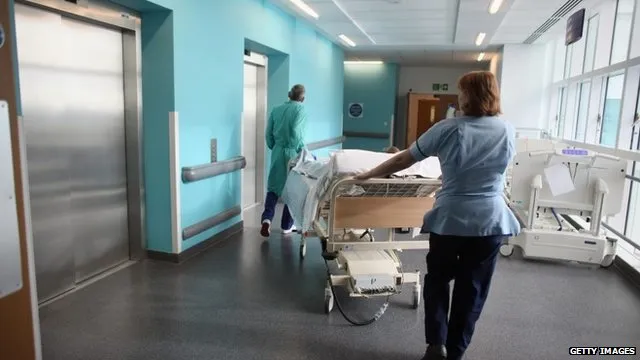The Royal College of Nursing (RCN) recently released a bombshell report highlighting the dire state of the NHS, revealing that patients are dying undetected in hospital corridors, while others are deprived of essential medical interventions due to overcrowding. The deeply troubling account paints a grim picture of a healthcare system struggling to meet the growing demands of patients, exacerbated by staffing shortages, lack of resources, and overcrowding in emergency departments.
Patients Dying in Hospital Corridors
The RCN’s 460-page report paints a harrowing picture of patient care within NHS hospitals. The testimony of over 5,400 nurses sheds light on the unimaginable conditions patients are enduring. One of the most disturbing findings is that patients have been found dead on trolleys and chairs in corridors and waiting rooms, often left undetected for hours. Nurses reported witnessing cardiac arrests in corridors where basic life-saving equipment like crash trolleys, defibrillators, and oxygen were unavailable, and the lack of space made it impossible to provide effective care.
Dr. Adrian Boyle, President of the Royal College of Emergency Medicine, called the reports from nurses “shocking” and “appalling,” stressing that this situation should be considered a “watershed moment” for the NHS. He highlighted that it’s essential to address these systemic failures immediately to restore the quality of care patients expect and deserve when they seek help from the NHS.
Impact on Maternity Care and Vulnerable Patients
The overcrowding situation has become so severe that even pregnant women have been subjected to unsafe and undignified care. Some women have suffered miscarriages in hospital corridors, a tragic reflection of the system’s failure to provide proper care for those in need. In some instances, patients were being administered intravenous infusions, blood transfusions, and other vital medical treatments in the corridors, unable to receive any comfort from family members due to the lack of space and resources.
One nurse recounted the emotional toll of delivering devastating news to a patient in a hospital corridor. The nurse described having to tell a patient they were dying, while other patients were wheeled past and orders were shouted across the unit. Such experiences demonstrate the dehumanization that many patients are enduring as the NHS struggles to cope with the surge in demand.
Lack of Resources and Staff Overload
The RCN’s report underscores the severe shortage of critical equipment and medical staff, both of which are key contributors to the breakdown in patient care. Nurses cited numerous instances where they had to perform tasks that required equipment unavailable in the corridors, or assist patients without the appropriate resources due to the overwhelming number of individuals requiring attention. The lack of adequate staff to care for patients in corridors, coupled with the emotional toll of witnessing patients suffering in such conditions, has led some nurses to leave the profession altogether.
One nurse in southeast England recounted the story of a patient who died in the corridor, undetected for hours, highlighting the systemic failures in the management of care. The overwhelming anxiety and fear of potentially losing more patients has led some nurses to quit their roles, further deepening the strain on the NHS workforce.
Government Response and Promises for Change
In response to the alarming findings in the report, Wes Streeting, the Health and Social Care Secretary, defended the government’s record on the NHS, acknowledging the failure of previous administrations in addressing these issues. He pointed out that corridor care had become “normalised” under the previous government, and that it had resulted in unsafe, undignified, and cruel conditions for patients. Streeting vowed to work towards ending this practice, though he acknowledged that it would take time to undo the damage caused by years of neglect.
Streeting also assured that the government is working on a plan to improve NHS urgent and emergency care, with a particular focus on GP services, ambulance services, and the 111 telephone advice service. However, he stopped short of promising that patients would no longer be treated in corridors next year, citing the long-term efforts needed to restore the NHS to full functionality.
The Winter Crisis and NHS Pressures
The report comes during one of the worst winter crises in NHS history, with approximately 20 hospital trusts in England declaring a “critical incident” due to the overwhelming number of patients in need of care. Many hospitals have struggled to keep up with demand, leading to ambulance delays and the diversion of patients to other hospitals unable to accommodate them.
Queen’s Hospital in Romford, for example, had to hire 19 additional nurses at a cost of £100,000 per month to address the rising number of patients stuck in corridors. The hospital’s A&E department, designed to accommodate 325 patients daily, was seeing more than double that number, and hospital officials said their A&E was no longer “fit for purpose.” They have called for £35 million to expand the facility and meet the growing demand for care.
Prof. Sir Stephen Powis, the NHS England’s national medical director, compared the situation in some hospitals to the most challenging days of the COVID-19 pandemic. Many NHS staff members, who have worked through the pandemic, reported that the current conditions are among the most difficult they have ever faced.
Staff Burnout and Emotional Toll
The emotional toll of working under these conditions is significant, and many nurses have reported experiencing severe anxiety, stress, and burnout as they struggle to care for patients in overcrowded and under-resourced environments. The report also highlighted that some patients, frustrated by the lack of care and the conditions in the corridors, are choosing to self-discharge, putting their health at further risk.
Nurses who are still in the profession are battling exhaustion and emotional distress. The RCN found that some nurses are leaving the emergency care sector altogether because they can no longer cope with the emotional strain of working in these conditions. The strain of constantly seeing patients who are neglected or harmed due to systemic failures is contributing to widespread burnout among healthcare professionals.
The findings of the RCN’s report serve as a stark reminder of the challenges the NHS faces in delivering quality care to patients. The report urges the government to take urgent action to address the lack of resources, overcrowding, and staff shortages that have left so many patients vulnerable. The situation requires a significant overhaul of NHS operations to ensure that patients receive the care they need in a safe, dignified, and timely manner.
As we move into the future, it is critical for the government to take immediate steps to address the root causes of these systemic failures, including funding, staffing, and infrastructure improvements. Until these issues are tackled, the tragic stories shared by nurses and patients alike will continue to highlight the deep flaws within the NHS. The time to act is now, and the government must ensure that this report does not become just another sad reminder of the toll that underfunding and mismanagement have taken on the NHS.






















